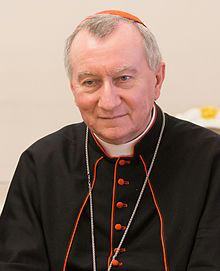Cardinal: Ridding world of nuclear weapons a moral imperative

Cardinal Parolin
Source: Vatican News
Cardinal Pietro Parolin, Vatican Secretary of State addressed a conference on nuclear disarmament in Assisi last week, arguing that the challenge is to overcome the logic of deterrence by adopt forward-looking strategies to achieve the common good. IN his video message, he repeated Pope Francis' call to convert weapons resources into a fund to fight poverty and promote development.
The meeting was organised by the Italian 'Committee for a Civilisation of Love' and held at the Sacro Convento in Assisi.
Cardinal Parolin noted that the pandemic "is teaching us an important lesson", namely that "it is necessary to reconsider our concept of security," which "cannot be based on the threat of mutual destruction and fear, but must find its foundation in justice, integral human development, respect for human rights, care for creation, promotion of educational and health facilities, dialogue and solidarity."
The meeting brought together different groups committed to promoting disarmament, the elimination of nuclear arsenals and their conversion into peace initiatives. Cardinal Parolin praised these efforts that are in line with the Holy See's vision of an international community based on the development and strengthening of "real and lasting trust" among nations. Such far-sighted strategies are necessary and urgent, he added, in the search for the common good.
"The ultimate goal of the total elimination of nuclear weapons is both a challenge and a moral and humanitarian imperative," the Cardinal said.
There are two events in the coming months in which the international community has the opportunity to make progress on this issues.
Next January the Tenth Review Conference of the Parties to the Treaty on the Non-Proliferation of Nuclear Weapons will take place. Cardinal Parolin says this will offer "a crucial moment for the international community and in particular for the nuclear powers" to "clearly demonstrate their ability to understand today's challenges, to face them and to resolve them."
In March, the first meeting between the signatories of the recent Treaty on the Prohibition of Nuclear Weapons will take place. Nuclear powers and states militarily allied to them (with the exception of the Netherlands) are not party to this treaty which came into force last January. But Cardinal Parolin called it "a success of multilateral diplomacy," recalling how "its negotiation and entry into force would not have been possible without the action of the many civil society associations committed to the continuous promotion of disarmament and peace."
In conclusion, Cardinal Parolin recalled Pope Francis' words for the 54th World Day of Peace:
on January 1, which should be considered as a guide for the next steps towards disarmament. "How many resources are spent on weaponry, especially nuclear weapons?" the Pope asks in the message. The answer he says would be to designate these resources for the promotion of peace, integral human development, and health through an institution such as global fund "in order to permanently eliminate hunger and contribute to the development of the poorest countries."
LINKS
Pope Francis' Message for World Day of Peace - www.vatican.va/content/francesco/en/messages/peace/documents/papa-francesco_20201208_messaggio-54giornatamondiale-pace2021.html
Vatican at UN calls for end to nuclear weapons - www.indcatholicnews.com/news/43151


















